Without having consulted either the Contingent Faculty Union or the Faculty Council, Ithaca College is currently terminating a number of full-time contingent faculty positions across several departments at IC. In art, art history, theatre arts, computer science, and accounting and business law, professors who have committed years of hard work and loyal service to the college have been abruptly dismissed, in spite of the fact that there is demonstrable instructional need for their courses — which include Integrated Core Curriculum classes. The ripple effect of these layoffs will impact not only the affected contingent professors, who are left scrambling to find another job in the fall, but continuing professors and students as well. Tenured/tenure-track faculty are already stretched thin and may not be able to offer as many upper-division seminars or specialized topics courses. IC students will be left without cherished contingent mentors, with fewer choices and with an impoverished course catalog.
It is ironic that while the college is thus sabotaging its own educational mission, it is initiating, with great fanfare, a search for a new “Vice President for Marketing and Enrollment Strategy.” This individual, our president tells us, will “envision and advance a symbiotic, creative, and trailblazing enrollment and marketing strategy.” Undoubtedly, such a paragon of profit can be lured to Ithaca only with a substantial salary offer — fortunately, we need not worry about where that money will come from since the college is cutting incidentals (such as professors and courses).
This troubling prioritization of marketing over education is symptomatic of the decline in American higher education. In the age of academic corporatization, colleges and universities are retooling themselves in the image of big business, with grim results. While college has become astronomically expensive for students, there are fewer and fewer secure jobs for faculty as tenure lines are cut, and the burden of teaching is outsourced to a growing underclass of cheap contingent labor, many of whom are paid poverty wages and lack benefits.
This sweatshop model of higher ed has taken root at the same time as the lucrative administrative sector at colleges and universities has mushroomed. Presidents, provosts, legal counsels and other administrators collect six-figure salaries while many of the professors who deliver the core purpose of any academic institution struggle to make ends meet, worried that they will be laid off next semester or get sick without having health insurance.
But shouldn’t things be different here at IC? After all, we are an institution of high humanistic ideals: According to the college’s mission statement, IC “is committed to creating an inclusive environment” in which all members of the college community “share the responsibilities of citizenship and service in the global community.” In a recent speech, President Shirley M. Collado argued that “[w]e need intentional movement toward humanity. We must live and lead with authenticity and courage.” Words to live by, indeed.
So why is it that at this humane, inclusive institution, contingent faculty continue to be treated as a disposable “(de)human(ized) resource”? Why is it that when budgets need to be tightened at IC, the first items to slash seem to be faculty and curriculum (rather than the lavish and constantly increasing salaries that our top administrators enjoy each year)? It seems that the current administration, like the previous one, fails to understand that teacher working conditions are student learning conditions and that a college that claims to be “student-centered” has to provide all of its faculty with a basic framework of institutional support if it wants to live up to the educational “standard of excellence” proclaimed by its mission statement.
President Collado, if you are truly interested in bringing your rhetoric of humanity and inclusion in line with the practices of the college, we urge you to put an end to the wave of terminations among full-time contingent faculty and to support the union in its efforts to end discriminatory labor practices at Ithaca College.
Correction: A previous version of this commentary said the Department of Writing also terminated some of its contingent faculty positions. All of the department’s full-time contingent faculty have been rehired for the next academic year.








